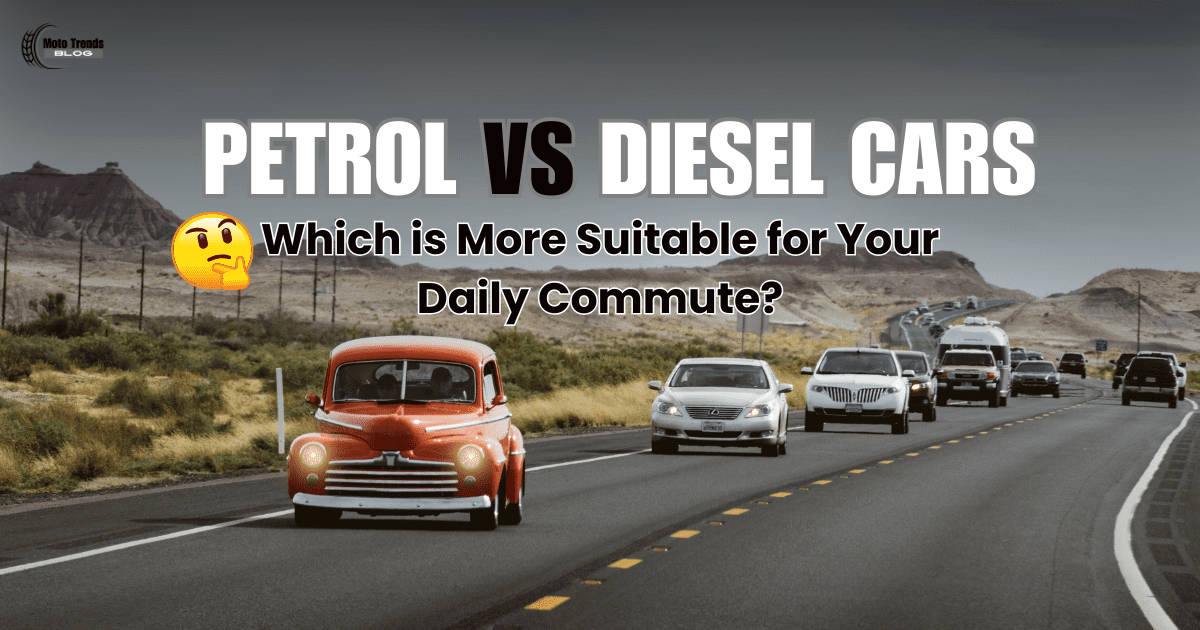The choice between petrol and diesel cars has long been a topic of debate among car buyers. While both types of engines have their advantages, the decision often depends on your personal needs, driving habits and the type of commute you experience every day. In this comprehensive guide, we will discuss the differences between petrol and diesel engines in depth, comparing them in terms of fuel efficiency, maintenance, performance, environmental impact and other factors to help you make the best decision for your daily commute.
Understanding the Basics: Petrol and Diesel Cars Engines
Before we discuss which engine type is better for your commute, it is important to understand how petrol and diesel cars engines work and what makes them different from each other.
Petrol Engines: Petrol engines use spark plugs to ignite the air-fuel mixture inside the combustion chamber. This leads to smooth combustion and power output, making petrol engines quieter and more refined. They typically have a faster throttle response, which many drivers find more enjoyable in stop-start urban traffic.
Diesel Engines: Diesel engines, on the other hand, rely on compression to ignite the air-fuel mixture. Diesel is more energy-denser than petrol, which means diesel engines generally offer more torque at lower RPMs. This makes them better for tasks requiring heavy pulling power and sustained high-speed driving, such as long-distance travel or travelling on the highway.
Fuel Efficiency: Mileage Comparison
One of the most important factors when choosing a car for daily commuting is fuel efficiency. Let’s compare how petrol and diesel cars fare in terms of mileage.
Petrol Cars: Petrol engines, while generally more refined, offer lower fuel efficiency than diesel engines. For city driving, where speeds are low and stop-and-go traffic is common, petrol engines consume more fuel. This is because petrol engines work best at higher RPMs, which is rarely achieved in city traffic.
For example, a typical petrol hatchback can offer around 14-18 kmpl in city driving conditions, and this number can go up to 18-22 kmpl on highways. Petrol engines are often more efficient for short-distance drives, where the engine does not need to run for long hours.
Diesel Cars: Diesel engines are known for their excellent fuel economy. While driving in the city, a diesel car can give you mileage of 18-25 kmpl, and this figure can go up to 25-30 kmpl on highways. This makes diesel cars a great choice for long-distance travellers, as they can cover more distance on less fuel.
Also, diesel engines work more efficiently at lower RPMs, which makes them ideal for city traffic, where there is constant stopping and starting. Diesel fuel is more energy-density, which means it requires less fuel to cover the same distance as a petrol car.
Which Is Better for Daily Commutes?
If your daily commute involves long-distance highway drives, a diesel engine will give you better mileage and help you save on fuel costs. However, if your commute is short and within the city, a petrol engine may be better for you due to the lower upfront cost and smoother driving experience.
Initial Cost and Maintenance
Another important factor when choosing between petrol and diesel cars is the initial cost and maintenance expenses.
Purchase Costs: Diesel cars generally come at a higher price than their petrol counterparts, often 10% to 15% more. This price difference is due to the more complex design of diesel engines, which are built to withstand higher pressures and temperatures.
For example, if a petrol car costs $10,000, the same model with a diesel engine may cost around $11,000-$11,500. This price disparity may make diesel cars less attractive to buyers on a budget.
Maintenance Costs: Diesel engines are generally more expensive to maintain. Their components are built to withstand higher levels of stress and pressure, making repairs and replacements costly. Routine maintenance for diesel engines, including oil changes and filter replacements, is more expensive than for petrol engines.
In addition, modern diesel engines have additional components such as turbochargers and particulate filters that require regular maintenance and these can increase long-term ownership costs.
Which is more economical for daily commuting?
If you have a limited budget or don’t plan to drive long distances every day, a petrol car may be a more economical option in terms of both purchase price and maintenance. However, if your daily commute is long, the fuel savings from a diesel engine may offset the higher maintenance and upfront costs over time.
Performance in Urban Environments
Performance is another important factor when deciding between petrol and diesel cars for your daily commute.
Petrol Engine Performance: Petrol engines offer smoother and more refined performance in urban environments. They accelerate faster and respond more effectively in stop-and-go traffic, which is common in city driving. Additionally, petrol engines are quieter and produce less vibrations, making them a more comfortable option for daily commuters.
The speed-friendly nature of petrol engines also means that they deliver power at higher RPMs, giving the driver a more lively and enjoyable driving experience, especially in urban conditions.
Diesel Engine Performance: Diesel engines are better in terms of torque, especially at lower RPMs, which gives them a powerful and stable pull in city traffic. However, the downside is that diesel engines are generally noisier than petrol engines and produce more vibrations. In congested traffic, this can result in a less refined driving experience.
Diesel engines are also heavier due to their robust build, which can make them feel more sluggish in stop-start urban traffic.
Which is better for city commuting?
Petrol engines generally offer a more comfortable and effortless driving experience for short daily trips in the city. Diesel engines, while powerful, can seem less refined and noisy in urban environments.
Environmental Impact
When choosing between petrol and diesel cars, it is important to consider their environmental impact, especially if you drive in a city that has strict pollution norms.
Petrol Cars: Petrol engines emit more CO2 than diesel engines, which contributes to global warming. However, they produce less nitrogen oxides (NOx) and particulate matter, making them less harmful in terms of air quality in urban areas.
Diesel Cars: Diesel engines emit significantly less CO2 than petrol engines, making them more fuel-efficient and contributing less to global warming. However, they emit high levels of NOx and particulate matter, which are harmful to human health and contribute to air pollution, especially in congested urban areas.
Emission Regulations: Many cities and countries are enforcing stricter emission norms for diesel vehicles due to their high NOx and particulate emissions. In some cities, diesel vehicles older than a certain age are banned from entering urban areas to reduce air pollution.
Which is better for the environment?
If you are concerned about air pollution and live in a city with strict emission regulations, a petrol car may be a better choice for your daily commute. However, if your priority is lower CO2 emissions and better fuel efficiency, a diesel engine may be more environmentally friendly over long distances.
Resale Value and Long-Term Considerations
When buying a petrol and diesel cars, it is also important to consider its resale value and long-term viability.
Petrol Cars: Traditionally, petrol cars have a lower resale value than diesel cars because they depreciate faster. However, with stricter emission norms and the rise of electric vehicles, the resale market for petrol cars may become more favourable in the long run.
Diesel Cars: Diesel cars have generally retained their value better due to their durability and fuel efficiency. However, with governments imposing stricter emission standards and phasing out diesel vehicles in some cities, the demand for used diesel cars may decline in the future.
Which car holds better value?
In the short term, diesel cars may offer better resale value, especially if you regularly travel long distances. However, as emission laws become stricter, demand for petrol cars may increase in urban markets, especially if hybrid or electric options are not yet widely available.
Best Choices: When to Pick a Petrol Car vs a Diesel Car
Based on the factors discussed above, here is a quick summary of when each type of car is the best choice for your daily commute:
Choose a petrol car if:
- You have to commute less within the city on a daily basis.
- You prefer smoother, quieter and more refined driving.
- Your budget is limited, and you want a more economical car with lower maintenance costs.
- You are concerned about stricter emission norms and want to avoid possible restrictions on diesel cars.
Choose a diesel car if:
- Your daily commute involves long-distance highway driving.
- You prioritise fuel efficiency and want to save on fuel costs over time.
- You don’t mind higher upfront costs and maintenance expenses.
- You need a car that can handle heavier loads or more torque on your daily commute.
Conclusion
Choosing between a petrol and diesel cars for your daily commute depends on a number of factors, including your driving habits, the distance you travel, and your budget. Petrol cars are generally better for short-distance, city commutes, offering a more comfortable and refined driving experience. Diesel cars, on the other hand, are better in fuel efficiency and torque, making them a better choice for long-distance commuters and those who frequently drive on highways.
Ultimately, your decision should be based on your specific needs, as well as long-term costs and environmental considerations. Whatever your choice, both petrol and diesel cars have their advantages, and understanding them can help you make an informed decision for your daily commute.

